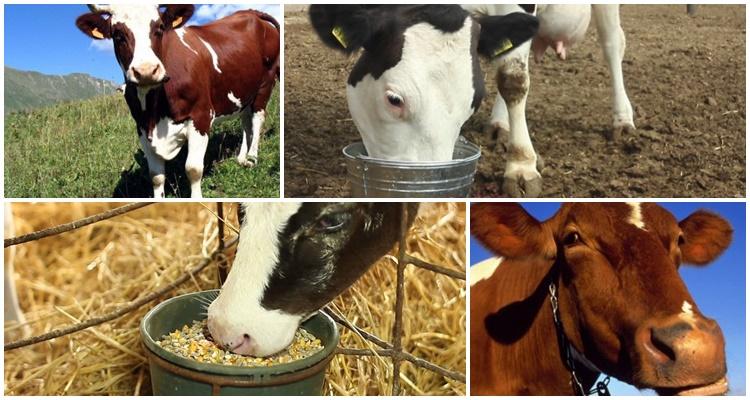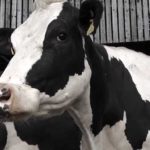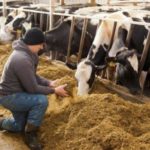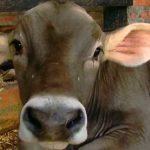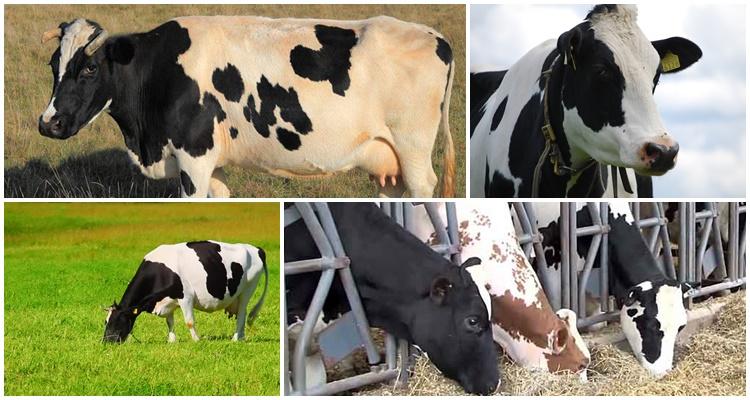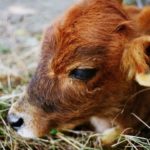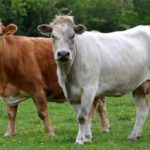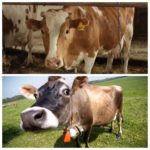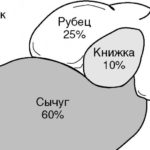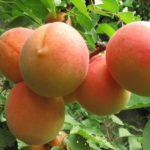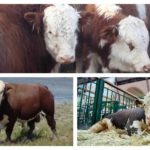In farmsteads where cows and other animals are kept, there are situations when cows eat food intended for other livestock, crushed grain, mixed feed from storage areas, and undiscarded waste. What to do if a cow has eaten too much crushed food or other carbohydrate feed, which can quickly ferment in the stomach and harm the animal’s condition? Let's look at what the danger is, what the symptoms are, treatment and prevention of this condition.
Why is overeating dangerous?
Cows develop a number of conditions as a result of overeating high-carbohydrate feeds.If therapeutic measures are not taken, they can quickly replace each other in order of worsening symptoms, up to the point of threatening the life of the animal. The development of a series of painful conditions is associated with changes in the cow’s stomach, specifically in its main section – the rumen.
As a result of overeating wheat, barley and corn, the condition of the cow is mild to moderate, since these grains are easily digestible, while oats are more severe, their grain is more difficult to digest. After crushed grain, the disease develops faster than after whole grain, and leads to more fatal results. The danger of consuming mixed feed is that its components can cause increased fermentation in the rumen. Overeating alfalfa, cabbage, and beets leads to the same consequences.
The initial pathological condition is swelling of the scar - tympany. Further fermentation of the compressed feed in it leads to the accumulation of liquid - acidosis, followed by a sharp decrease in the acidity of the rumen contents and the replacement of beneficial microflora with pathological ones. The next stage, when pathogens release toxins into the blood, is characterized by depression of cardiac activity and kidney function and is a very alarming condition leading to the death of the animal.
If an animal manages to overcome a state of severe poisoning of the body as a result of overeating, there may be long-term consequences in the form of fungal infections of the rumen, liver abscesses for several months, which significantly reduces the animal's life expectancy. If a pregnant cow has eaten too much, she may abort after 10-14 days.
Factors that provoke indigestion
Inflammation of the rumen can be provoked by a sharp transition from one type of feed to another, or by exceeding the volume of grain feed in the daily diet. In cows, the rumen contracts after the dry period, and a sharp increase in the amount of feed at the onset of pregnancy can also lead to acidosis. It is important not to allow the scar volume to shrink.
The amount of feed in the diet is reduced by 2-3 months and high-quality roughage is left.
Other factors of improper functioning of the stomach are feeding with low-quality feed, the predominance of frozen or rotting foods in the feed - apples, potatoes, carrots, cabbage. For the normal condition of cows, 10 to 15-20 kg of grain or feed mass can be dangerous. In this case, in 2-6 hours the microbial population in the rumen completely changes.
Signs and symptoms of overeating
Initially, cows belch from excessive accumulation of gases and tympany, and the animals drink a lot. As fluid accumulates, belching disappears, thirst is replaced by a complete refusal of water, a sharp increase in dehydration and anuria.
Other signs of overeating include:
- refusal of food, lack of chewing gum;
- diarrhea - masses of fetid manure, yellow in color, with undigested particles;
- bloating, rumbling in the rumen or lack of movement in it (hypo- and atony);
- salivation increases;
- drying of the upper lip and nose;
- increased breathing and heart rate;
- increased body temperature (rare);
- depressed or aggressive state.
If the animal does not get up for 24-48 hours, this is an alarming sign, you need to immediately call a veterinarian!
With a loss of 10-12 percent of fluid from body weight, the prognosis for the life of the animal is unfavorable.
What do we have to do?
If it is noticed that the animal has eaten food that was not intended for it, or has been feeding uncontrollably, then you should force it to move as much as possible, give it warm water or chamomile infusion. If there is bloating and no movement in the rumen, massage the left side of the abdomen counterclockwise.
The rumen may need to be washed. The animal is first given a large amount of water. The procedure is carried out using a hose 2.5-3 meters long and 3-4 centimeters in diameter, the tip is lubricated with fat or oil. The hose is not quickly directed into the rumen; the free end is lowered below the level of the animal’s stomach. Wait until the contents of the rumen gradually come out. In severe cases of the disease, drug treatment is necessary:
- droppers with sodium chloride;
- glucose injections;
- vitamin B injections1 (thiamine) – 2-5 milliliters 2-3 times a day;
- after a few days of illness, antibiotics “Macerobacillin” and “Tetracycline” are needed (100 g twice a day for an adult animal).
- ruminators and emetics (“Timpanol”).
Diarrhea in an animal is a positive sign. It indicates that the animal’s body is actively getting rid of toxins, and after 3-4 days there is usually a return to normal nutrition. It’s worse if the animal develops anuria, refuses water, and has no bowel movements. Here you can’t do without installing IVs.
Preventive measures and feeding requirements
In order to prevent digestive disorders in cows, it is important to do the following:
- strictly adhere to feeding standards;
- use high quality feed;
- when switching to other types of feed, observe the principle of gradualness and at the same time give roughage in the form of hay to stimulate the stomach;
- add minerals to the feed - salt, chalk;
- use vitamin-rich vegetables in your diet - carrots, pumpkin, fodder beets.
Attentive attitude towards the wards, strict feeding discipline will help maintain the productivity and healthy condition of the animals.

